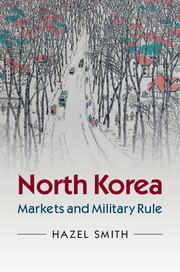Book contents
- Frontmatter
- Dedication
- Contents
- Acknowledgements
- Introduction: North Korea: politics, economy and society
- Part I Jettisoning caricatures: understanding history
- Part II The rise and fall of Kim Il Sungism
- 3 Colonial occupation and the rise of Kim Il Sung
- 4 War-fighting as state-building
- 5 ‘Socialism in our own style'
- 6 Sisyphus as economic model
- 7 Social stratification in the workers' state
- 8 Famine and the end of Kim Il Sungism
- Part III Marketisation and military rule
- Bibliography
- Index
8 - Famine and the end of Kim Il Sungism
from Part II - The rise and fall of Kim Il Sungism
Published online by Cambridge University Press: 05 May 2015
- Frontmatter
- Dedication
- Contents
- Acknowledgements
- Introduction: North Korea: politics, economy and society
- Part I Jettisoning caricatures: understanding history
- Part II The rise and fall of Kim Il Sungism
- 3 Colonial occupation and the rise of Kim Il Sung
- 4 War-fighting as state-building
- 5 ‘Socialism in our own style'
- 6 Sisyphus as economic model
- 7 Social stratification in the workers' state
- 8 Famine and the end of Kim Il Sungism
- Part III Marketisation and military rule
- Bibliography
- Index
Summary
The Kim family leadership perceived the end of the Cold War in Europe as providing the opportunity for the exercise of untrammelled power by the United States and feared military intervention from abroad to secure regime change. The government attempted diplomatic engagement with South Korea but also engaged in a nuclear development programme so as to provide the option of building a North Korean nuclear weapon. Kim's policies were challenged by the United States administration of President Clinton to the point that both sides understood the outbreak of war as imminent in mid-1994. Only a last-minute intervention by former United States President Jimmy Carter de-escalated the conflict and allowed for bilateral negotiations that continued after Kim Il Sung's death, in July 1994 aged 82. The North Korean political establishment continued to negotiate with the United States to produce the ‘Agreed Framework', sometimes known as the Geneva Agreement for the location in which it was signed, in October 1994.
The diplomatic crisis of the early 1990s consumed government attention to the extent that the economic crisis, triggered by the decision of the Soviet Union and China to end subsidies to the DPRK, was initially treated by the North Korean government as similar in scale to crises of previous eras. The population was urged to do more with less and muddle through. The government made defence cuts but these were not substantial enough to have much of an impact on the expanding economic crisis that developed into a national food emergency.
Kim Il Sung and Kim Jong Il initially appeared paralysed by the scale and scope of what turned into a catastrophe for North Korea's population, as both continued to prioritise regime security over economic policy. Industrial and agricultural production plummeted. Most of the population had few alternatives to state provision as private production was minimal and markets were undeveloped. When the state's food distribution system finally collapsed in the mid-1990s, starvation ensued and the resulting famine killed up to a million people between 1993 and 1998.
- Type
- Chapter
- Information
- North KoreaMarkets and Military Rule, pp. 186 - 208Publisher: Cambridge University PressPrint publication year: 2015



